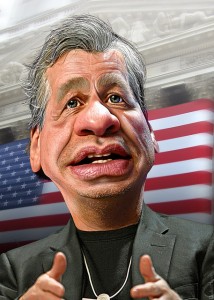James Rufus Koren writes: Outraged senators castigated Wells Fargo & Co. Chief Executive John Stumpf this week for not seeking to take back some of the $100 million awarded to a retiring executive who oversaw the division at the heart of the company’s fake-accounts scandal.
But whenever Stumpf, 63, eventually departs from his post atop the San Francisco banking giant, he could walk away with far more — nearly $195 million in cash, stock and other compensation, a review of the bank’s regulatory filings show.
While it’s almost certain Stumpf will keep the vast majority of that sum given the bank’s compensation policy, both he and Carrie Tolstedt, the retiring executive who headed the bank’s retail operations, could lose tens of millions of dollars over the still-unfolding scandal.
The bank has agreed to pay $185 million to federal regulators and the Los Angeles city attorney’s office over the creation of as many as 2 million fake accounts, a practice regulators say was encouraged by a demanding and poorly supervised sales culture. But trouble for the bank has continued to grow since the settlement was announced.
Federal prosecutors are investigating the bank to see whether criminal charges should be filed, while senators have called for the Labor Department to investigate possible labor law violations. And there’s a growing chorus of investors, corporate governance experts and others calling for Wells Fargo to cut or cancel executives’ pay over the scandal.
At a Senate Banking Committee hearing last week, Sen. Bob Corker (R-Tenn.) said that the bank would be committing “malpractice from the standpoint of just public relations” if it does not dock executives’ pay. Analysts who follow the bank expect that means both Stumpf and Tolstedt will lose some compensation.
We wonder whether this relatively tame assessment can really inhibit bad bank behavior. Despite Elizabeth Warrne’s wanrings to the Democratic Presidential nominee. Should she win in November, it is unlikely that she will go after bankers who have supported hr campaign and also helped she and her husband accumulate $250 million of their own money.








